Probe VP Steve Cable examines some of the findings of the Probe Survey 2020: The Changing Face of Christianity in America.
Religious Trends Over the Last Fifty Years
In late 2020, Probe administered a new survey{1} to over 3,000 Americans ages 18 through 55 as a follow up to our 2010 survey{2}. Comparing these two surveys reveals a striking decline in Christian religious beliefs and practice across America over the last decade. Before focusing on these changes, let’s begin with a foundational question.
 How have young adult religious affiliations changed over the last five decades?
How have young adult religious affiliations changed over the last five decades?
As documented in the General Social Surveys{3} from 1970 through 1990, their religious affiliations remained fairly constant. Since then, there have been significant changes.
The most dramatic change is found in young adults under thirty who select a non-Christian affiliation. This group grew from about one fifth of the population in 1990 to almost half today. Those non-Christians from other religious faiths{4} such as Judaism, Islam, and Mormonism, grew slightly up to about 10% of the U.S. young adult population. At the same time, the Unaffiliated (i.e. Atheist, Agnostic or Nothing in Particular) almost tripled to over a third of the population. Among the Unaffiliated, the Nothing in Particular category had by far the largest growth. The Pew Research surveys show an even greater increase, growing from 27% in 1996 to 59% in 2020.
Now bringing in the data from GSS 2010 survey, we learn that 26% of those in their twenties were Unaffiliated in 2010, growing to 30% of those in their thirties in 2018. This result means that more people in their twenties became Unaffiliated in their thirties. This result runs directly counter to the supposition of many that the growth in Unaffiliated would dissipate as young adults age and return to churches to raise their families.
Conversely, Christian groups declined with Other Protestants{5} dropping by half, from about one in four down to less than one in eight young adult Americans. Catholics also experienced major losses, dropping by one quarter down to less than one in five young adult Americans over this thirty-year period.
Although less affected, the Evangelical affiliation also experienced a drop in recent years. GSS reported a small decline in young adult, born again Protestants, from about one in four down to around one in five Americans. Pew Research{6} reported a steeper decline in young adult Evangelicals, from 28% in 2007 down to 20% in 2019.
Perhaps this decline is a winnowing out of those whose Christian beliefs are not vital to their lives. In which case, a greater percentage of born again Christians should hold a strong biblical worldview now in 2020 than in 2010. In the next section, we will explore this topic to find out the truth of the matter.
Born Again Young Adults and a Biblical Worldview
In the next sections, we will be focusing on Born Again Christians in our Probe results. A Born Again Christian is someone who says:
1. I have made a personal commitment to Jesus that is still important in my life today and
2. I will go to heaven because I confessed my sins and accepted Jesus Christ as my savior.
We can compare the responses of Born Again Christians to those of Other Protestants and Catholics.
What portion of these three groups have a Basic Biblical Worldview strongly affirming that:
1. God is the all-powerful, all knowing, perfect creator who rules the world today.{7}
2. The Bible is totally accurate in all of its teachings.
3. A person cannot be good enough to earn a place in heaven.
4. While on earth, Jesus committed no sins like other people do.
All four concepts above are key components of God’s redemptive plan. For example, Jesus being sinless made it possible for his death to redeem us.{8} Or, if the Bible is inaccurate in some of its teachings how could we know that it is correct in teaching about redemption?
In 2020 for those ages 18 through 39, one of four Born Again Christians, one of twenty Other Protestants and one of one hundred Catholics affirmed all four of these foundational beliefs. The statement least likely to be affirmed by all three groups was “a person cannot earn a place in heaven”. Perhaps many have been influenced by the current postmodern thinking that what’s not true for you can be true for someone else.
Only Born Again Christians had a sizable minority of one fourth affirming this worldview. In contrast, nearly half of Born Again Christians affirmed it in 2010. Clearly, this last decade had a serious impact on the perception of what it means to be a Christian.
We see a similar drop when comparing those ages 18 to 29 in 2010 with the same cohort now 30 to 39 in 2020, once again belying the notion that young adults will return to a conservative faith in their thirties. Instead of a noticeable increase as the cohort aged, we see a sizeable drop in those who affirm these key Christian doctrinal statements.
As the percent of true Christians drops, the ability to reach out with the gospel is surely reduced. However, Christians in the Roman Empire in AD 60 were an even smaller portion. Three hundred years later virtually the entire empire was nominally Christian. If we “proclaim the excellencies of Him who called us out of darkness into His marvelous light{9},” God will bring many to repentance.
Born Again Young Adults and Pluralism
Pluralism is the belief that there are multiple ways to be right with God. Pluralism and Christianity are not compatible. Jesus clearly stated, “No one comes to the Father except through me.”{10} The
high price paid through Jesus’ life and death excludes the possibility of Jesus being one of several options. As the Apostle Paul wrote, “There is salvation in no other name under heaven . . . by which we must be saved.”{11}
What does Probe’s new survey reveal about pluralism? Confronted with the statement, “Muhammad, Buddha and Jesus all taught valid ways to God,” how did American Christians respond? Do they align with clear biblical teaching by strongly disagreeing? For those ages 18 through 39, we found that about one third of Born Again Christians, one in eight Other Protestants, and one in twenty Catholics did so. An overwhelming majority of Christians chose to accept a belief that devalues the death and resurrection of our Lord. Once again, only Born Again Christians had a sizeable minority of one third who agreed with Jesus and the New Testament.
Looking back to 2010, was there a significant change among Born Again Christians during this decade? For the same age group, the percent in 2010 strongly disagreeing was almost one half, compared to the one third in 2020. So, more Christians than ever have no reason to share their faith with people of other religions. As the need for evangelism increases, the number of Christians who believe evangelism is even needed by people of other religions decreases.
The age group 18 to 29 saw 45% choosing a non-pluralist view in 2010 with that same age cohort (now 30 to 39) dropping to 35% in 2020. Once again, we see that as Born Again Christians are maturing, more of them are abandoning rather than clinging to the strong truth of the gospel of Jesus Christ.
To counter this slide with the young adults we know, please:
1. Pray for the Lord to send laborers into the harvest, opening their to the infinite value of the gospel.
2. Explain that the chasm is so great only God can make a way of reconciliation. As Paul wrote, “God desires all men to be saved and to come to the knowledge of the truth. For there is one God and one intermediary between God and humanity, Jesus . . . who gave himself as a ransom for all . . .”
{12}
3. Explain that your accepting pluralism will not get your non-Christian friends into heaven. Only the truth of Christ presented to them by willing lips has power over their eternal destiny.
Young Adults and Jesus Our Savior
Probe’s new survey shows that professing to be born again does not equate to orthodox biblical beliefs. In this section, we will see this borne out in beliefs about Jesus Christ.
First, why did Jesus die on a cross? The Bible is clear Jesus chose the cross. “He did it to redeem us by taking our sins and our punishment upon Himself.” Close to nine out of ten 18- to 39-year-old, Born Again Protestants selected this answer.{13} All Christian leaders should want their people to know Jesus’ role in their redemption, even those with a works-based gospel. Yet less than two thirds of Other Protestants and Catholics selected that answer.
Many said either the Jewish or Romans leaders caused Jesus’ death. But Christians should know that prior attempts by those groups were supernaturally thwarted.
Second, “Jesus will return to this earth to save those who await his coming.”
This statement comes from scripture, “ . . . so Christ, having been offered once to bear the sins of many, will appear a second time, . . . to save those eagerly waiting for him.”{14} As you can see, this verse answers both questions. The apostle Paul wrote, “For the Lord himself will come down from heaven . . . and the dead in Christ will rise first.”{15}
Around two thirds of Born Again Protestants strongly agree that Jesus will return to save. Apparently, the remaining third are not sure.
For other Christian groups, only about one third of them strongly agreed.
The third question is: “When he lived on earth, Jesus committed sins like other people.”
The Bible clearly states, “God made the one who did not know sin to be sin for us so that in Him we would become the righteousness of God.“{16} God laid our sins upon Jesus in his earthly death. If Jesus were a sinner like you and I, His death would have been for His own sin.
Once again, about one third of Born Again Protestants did not select Disagree Strongly. Having this large group who don’t understand biblical Christianity is disappointing.
Young adult Born Again Protestants drop down to about one half when looking at all three questions together. It appears the other half are trusting Jesus to save them, without a good understanding of who Jesus is. All other Christian groups drop to one in ten or less professing these truths about Jesus.
Finally, we find nine out of ten people with a Basic Biblical Worldview also select a biblical answer for the three Jesus questions. This shows a strong correlation between a Basic Biblical Worldview and an understanding of Jesus’ purpose.
Are the Unaffiliated Uncommitted Christians?
In this section we will access Probe’s 2020 survey to learn about those identifying as Agnostic or Nothing in Particular. We will call them AGNIPS. Perhaps, as some have suggested, a significant percentage are really Christians not affiliated with any denomination.
Among those ages 18 through 39, one in five are AGNIPS. About one third of these were Protestants as children but only three out of one hundred profess to being born again. So, it appears unlikely that any significant portion of the AGNIPS are latent Born Again Christians.
Of course, many people professing to be Christians do not qualify as Born Again. So perhaps many AGNIPS are latent Other Protestants or Catholics. Let’s look at three different metrics to see if this proposition is supported by data.
First, look at a nominal level of religious activity: pray at least daily and read your Bible at least weekly. I think anyone not doing these has little interest in their faith. For this young adult segment, 35% of Born Again Christians and almost 30% of Other Protestants and Catholics but less than 5% of AGNIPS perform these activities. Compared to professing Christians, the AGNIPS have very few doing these activities.
Looking only at AGNIPS who were affiliated with a Protestant faith as a child, we find only 3% performing these activities.
A second metric: how about those who believe God is creator and active in the world and do not believe good works will get them into heaven? We find: 33% Born Again Christians, 4% Other Protestants and Catholics, around 0.5% of all AGNIPS and only 0.4% of AGNIPS with a childhood Protestant affiliation.
Finally, of those who strongly agrees with the statement, “I believe that the only path to a true relationship with God is through Jesus Christ.” Once again: 64% of Born Again Christians, 28% of Other Protestants and Catholics, 5% of all AGNIPS and 5% of AGNIPS with a childhood Protestant affiliation.
All of these metrics agree that very few young adults who are Agnostics or Nothing in Particular appear to have latent Christian beliefs. Even those who were affiliated with a Protestant church as a child did not have a higher level of affiliation with Christian beliefs.
Over this last decade, among Born Again Christians, a basic biblical worldview and understanding of Jesus is decreasing while pluralism is increasing. And the growing AGNIP population is far removed from Christian thought. Those who follow Christ, must respond by speaking the truth about Christ in our churches, our neighborhoods, and the world. We cannot expect any of these groups to just come back to a solid Christian belief. We must reach out to them.
Notes
1. Our new 2020 survey looks at Americans from 18 through 55 from all religious persuasions. Although still focused on looking at religious beliefs and attitudes toward cultural behaviors, we expanded the scope surveying 3,106 Americans ages 18 through 55. Among those responses, there are 717 who are Born Again allowing us to make meaningful comparisons with our 2010 results while also comparing the beliefs of Born Again Christians with those of other religious persuasions.
2. Our previous survey, the 2010 Probe Culturally Captive Christians survey, was limited to Born Again American’s ages 18 through 40. This survey of 817 people was focused on a obtaining a deeper understanding of the beliefs and behaviors of young adult, Born Again Christian Americans. For a detailed analysis of the outcomes of our 2010 survey and other surveys from that decade, go to our book Cultural Captives: The Beliefs and Behavior of American Young Adults
3. General Social Survey data was downloaded from the Association of Religion Data Archives, www.TheARDA.com, and were collected by the National Opinion Research Center.
4. Note that the Other Religions category includes Christian cults (e.g. Mormon, Jehovah’s Witnesses), Jews, and other world religions.
5. Protestants who did not profess to being born again
6. U.S. Religious Landscape Survey 2007, U.S. Religious Landscape Survey 2014, Religious Knowledge Survey 2019 Pew Forum on Religion & Public Life (a project of The Pew Research Center). The Pew Research Center bears no responsibility for the analyses or interpretations of the data presented here. The data were downloaded from the Association of Religion Data Archives, www.TheARDA.com, and were collected by the Pew Research Center.
7. Other answers to select from:
• God created but is no longer involved with the world today.
• God refers to the total realization of personal human potential.
• There are many gods, each with their different power and authority.
• God represents a state of higher consciousness that a person may reach.
• There is no such thing as God.
• Don’t know
8. See for example 2 Corinthians 5:21, Hebrews 4:15
9. 1 Peter 2:9
10. John 14:6
11. Acts 4:12
12. 1 Timothy 2:4-6
13. Other answers included:
• He threatened the Roman authority’s control over Israel.
• He threatened the stature of the Jewish leaders of the day.
• He never died on a cross.
• He failed in his mission to convert the Jewish people into believers.
14. Hebrews 9:27-28 ESV
15. 1 Thessalonians 4:16
16. 2 Corinthians 5:21 NET
©2023 Probe Ministries
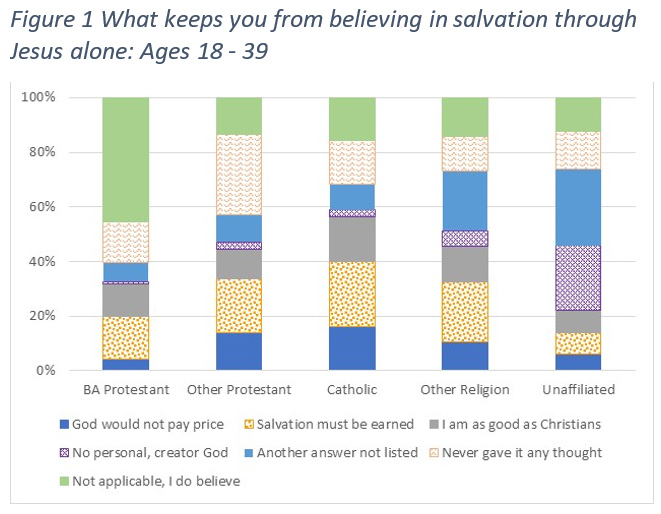
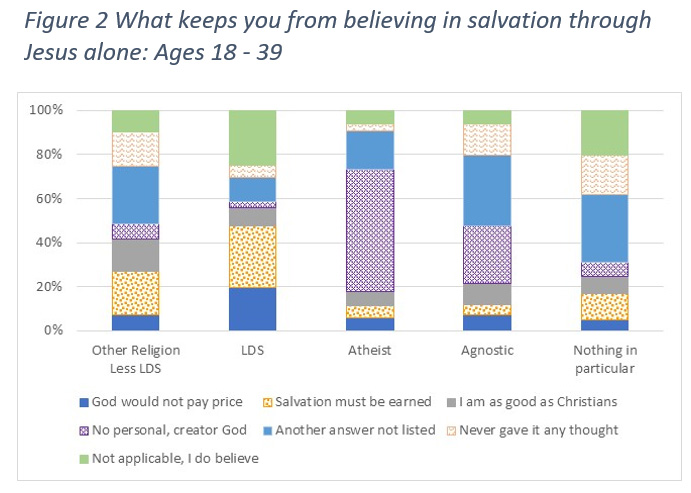 To get a better understanding of what drives these results, we dove further into the makeup of each of these two groups. The results are shown in Figure 2.
To get a better understanding of what drives these results, we dove further into the makeup of each of these two groups. The results are shown in Figure 2.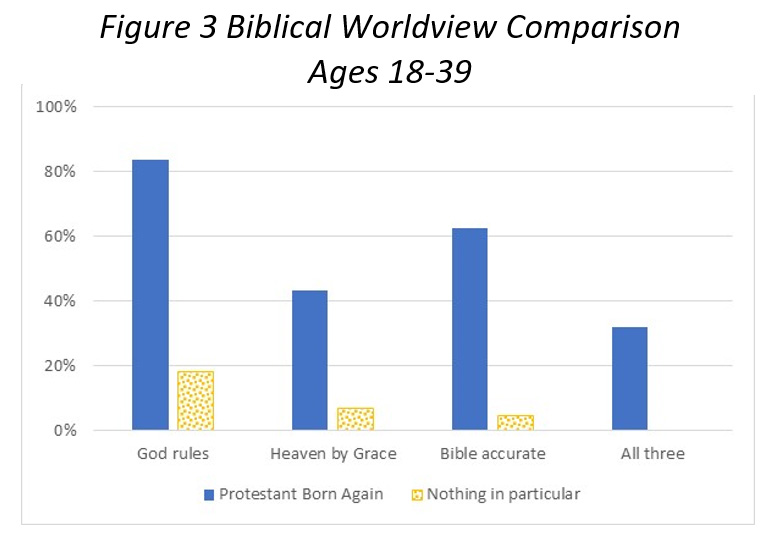 Let’s compare the results for Born-again Protestants and those who claimed to be Nothing in Particular. As shown in Figure 3, for each of the questions those agreeing with a biblical worldview among the Nothing in Particulars is a small fraction of those among Born-again Protestants. When we combine the three questions together, we see one out of three Born-again Protestants vs. no NIPs. Certainly, some of these NIPs came from an evangelical background, but none of them interviewed in our survey ascribe to a basic evangelical worldview as adults. As noted in our first report, one in three orn-again Protestants is a disappointing percentage ascribing to these biblical worldview questions, but it is certainly dramatically better than the Nothing in Particular group.
Let’s compare the results for Born-again Protestants and those who claimed to be Nothing in Particular. As shown in Figure 3, for each of the questions those agreeing with a biblical worldview among the Nothing in Particulars is a small fraction of those among Born-again Protestants. When we combine the three questions together, we see one out of three Born-again Protestants vs. no NIPs. Certainly, some of these NIPs came from an evangelical background, but none of them interviewed in our survey ascribe to a basic evangelical worldview as adults. As noted in our first report, one in three orn-again Protestants is a disappointing percentage ascribing to these biblical worldview questions, but it is certainly dramatically better than the Nothing in Particular group.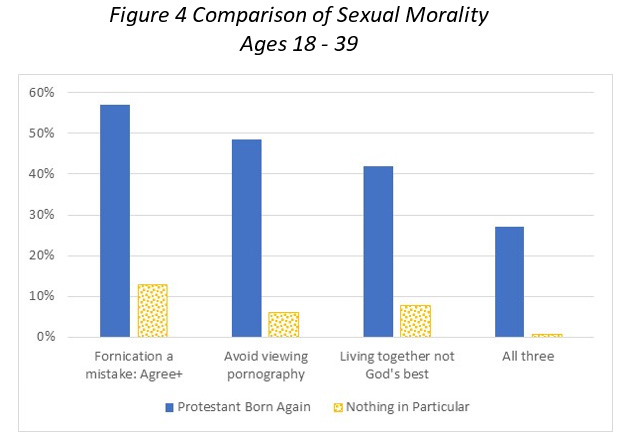 The results from our survey are shown in Figure 4. Once again, we see a large difference between these two groups. Clearly, the NIPs do not ascribe to a biblical view on sexual morality. The majority of Born-again Protestants do not ascribe to those beliefs either, but a significant minority of them do.
The results from our survey are shown in Figure 4. Once again, we see a large difference between these two groups. Clearly, the NIPs do not ascribe to a biblical view on sexual morality. The majority of Born-again Protestants do not ascribe to those beliefs either, but a significant minority of them do.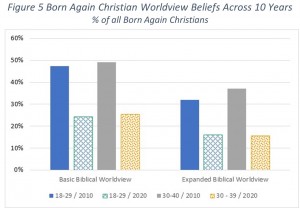 Now let’s compare these 2020 results with the results from our 2010 survey. Figure 5 shows the results across this decade for Born Again Christians looking at the percent who agree with the worldview answers above. As shown, there has been a dramatic drop in both the Basic Biblical Worldview and the Expanded Biblical Worldview.
Now let’s compare these 2020 results with the results from our 2010 survey. Figure 5 shows the results across this decade for Born Again Christians looking at the percent who agree with the worldview answers above. As shown, there has been a dramatic drop in both the Basic Biblical Worldview and the Expanded Biblical Worldview.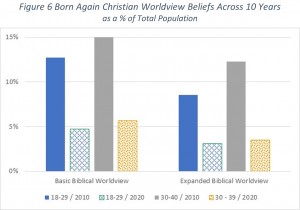 However, because the percent of the population who profess to being born again has dropped over the last ten years as well, the situation is even worse. We need to look at the percent of Americans of a particular age range who hold to a Biblical Worldview. Those results are shown in Figure 6. Once again, comparing the 18–29 age group from 2010 with the same age group ten years later now 30–39, we find an even greater drop off. For the Basic Biblical Worldview, we see a drop off from 13% of the population down to 6%. For the Expanded Biblical Worldview, the decline is from 9% down to just over 3% (a drop off of two thirds).
However, because the percent of the population who profess to being born again has dropped over the last ten years as well, the situation is even worse. We need to look at the percent of Americans of a particular age range who hold to a Biblical Worldview. Those results are shown in Figure 6. Once again, comparing the 18–29 age group from 2010 with the same age group ten years later now 30–39, we find an even greater drop off. For the Basic Biblical Worldview, we see a drop off from 13% of the population down to 6%. For the Expanded Biblical Worldview, the decline is from 9% down to just over 3% (a drop off of two thirds).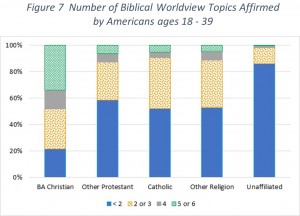 Rather than look at the two biblical worldview levels discussed above, we will look at how many of the six biblical worldview questions they answered were consistent with a biblical worldview. In the chart, we look at 18- to 39-year-old individuals grouped by religious affiliation and map what portion answered less than two of the questions biblically, two or three, four, or more than four (i.e., five or six).
Rather than look at the two biblical worldview levels discussed above, we will look at how many of the six biblical worldview questions they answered were consistent with a biblical worldview. In the chart, we look at 18- to 39-year-old individuals grouped by religious affiliation and map what portion answered less than two of the questions biblically, two or three, four, or more than four (i.e., five or six).